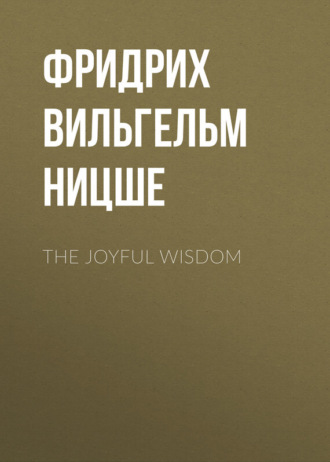 полная версия
полная версияThe Joyful Wisdom
Knowledge of Distress. —Perhaps there is nothing by which men and periods are so much separated from one another, as by the different degrees of knowledge of distress which they possess; distress of the soul as well as of the body. With respect to the latter, owing to lack of sufficient self-experience, we men of the present day (in spite of our deficiencies and infirmities), are perhaps all of us blunderers and visionaries in comparison with the men of the age of fear – the longest of all ages, – when the individual had to protect himself against violence, and for that purpose had to be a man of violence himself. At that time a man went through a long schooling of corporeal tortures and privations, and found even in a certain kind of cruelty toward himself, in a voluntary use of pain, a necessary means for his preservation; at that time a person trained his environment to the endurance of pain; at that time a person willingly inflicted pain, and saw the most frightful things of this kind happen to others without having any other feeling than for his own security. As regards the distress of the soul however, I now look at every man with respect to whether he knows it by experience or by description; whether he still regards it as necessary to simulate this knowledge, perhaps as an indication of more refined culture; or whether, at the bottom of his heart, he does not at all believe in great sorrows of soul, and at the naming of them calls to mind a similar experience as at the naming of great corporeal sufferings, such as tooth-aches, and stomach-aches. It is thus, however, that it seems to be with most people at present. Owing to the universal inexperience of both kinds of pain, and the comparative rarity of the spectacle of a sufferer, an important consequence results: people now hate pain far more than earlier man did, and calumniate it worse than ever; indeed people nowadays can hardly endure the thought of pain, and make out of it an affair of conscience and a reproach to collective existence. The appearance of pessimistic philosophies is not at all the sign of great and dreadful miseries; for these interrogative marks regarding the worth of life appear in periods when the refinement and alleviation of existence already deem the unavoidable gnat-stings of the soul and body as altogether too bloody and wicked; and in the poverty of actual experiences of pain, would now like to make painful general ideas appear as suffering of the worst kind. – There might indeed be a remedy for pessimistic philosophies and the excessive sensibility which seems to me the real "distress of the present": – but perhaps this remedy already sounds too cruel, and would itself be reckoned among the symptoms owing to which people at present conclude that "existence is something evil." Well! the remedy for "the distress" is distress.
49Magnanimity and allied Qualities. —Those paradoxical phenomena, such as the sudden coldness in the demeanour of good-natured men, the humour of the melancholy, and above all magnanimity, as a sudden renunciation of revenge or of the gratification of envy – appear in men in whom there is a powerful inner impulsiveness, in men of sudden satiety and sudden disgust. Their satisfactions are so rapid and violent that satiety, aversion and flight into the antithetical taste, immediately follow upon them: in this contrast the convulsion of feeling liberates itself, in one person by sudden coldness, in another by laughter, and in a third by tear and self-sacrifice. The magnanimous person appears to me – at least that kind of magnanimous person who has always made most impression – as a man with the strongest thirst for vengeance, to whom a gratification presents itself close at hand, and who already drinks it off in imagination so copiously, thoroughly, and to the last drop, that an excessive, rapid disgust follows this rapid licentiousness; – he now elevates himself "above himself," as one says, and forgives his enemy, yea, blesses and honours him. With this violence done to himself, however, with this mockery of his impulse to revenge, even still so powerful he merely yields to the new impulse, the disgust which has become powerful, and does this just as impatiently and licentiously, as a short time previously he forestalled, and as it were exhausted, the joy of revenge with his fantasy. In magnanimity there is the same amount of egoism as in revenge, but a different quality of egoism.
50The Argument of Isolation.– The reproach of conscience, even in the most conscientious, is weak against the feeling: "This and that are contrary to the good morals of your society." A cold glance or a wry mouth on the part of those among whom and for whom one has been educated, is still feared even by the strongest. What is really feared there? Isolation! as the argument which demolishes even the best arguments for a person or cause! – It is thus that the gregarious instinct speaks in us.
51Sense for Truth. —Commend me to all scepticism where I am permitted to answer: "Let us put it to the test!" But I don't wish to hear anything more of things and questions which do not admit of being tested. That is the limit of my "sense for truth": for bravery has there lost its right.
52What others Know of us. —That which we know of ourselves and have in our memory is not so decisive for the happiness of our life as is generally believed. One day it flashes upon our mind what others know of us (or think they know) – and then we acknowledge that it is the more powerful. We get on with our bad conscience more easily than with our bad reputation.
53Where Goodness Begins. —Where bad eyesight can no longer see the evil impulse as such, on account of its refinement, – there man sets up the kingdom of goodness; and the feeling of having now gone over into the kingdom of goodness brings all those impulses (such as the feelings of security, of comfortableness, of benevolence) into simultaneous activity, which were threatened and confined by the evil impulses. Consequently, the duller the eye so much the further does goodness extend! Hence the eternal cheerfulness of the populace and of children! Hence the gloominess and grief (allied to the bad conscience) of great thinkers.
54The Consciousness of Appearance. —How wonderfully and novelly, and at the same time how awfully and ironically, do I feel myself situated with respect to collective existence, with my knowledge! I have discovered for myself that the old humanity and animality, yea, the collective primeval age, and the past of all sentient being, continues to meditate, love, hate, and reason in me, – I have suddenly awoke in the midst of this dream, but merely to the consciousness that I just dream, and that I must dream on in order not to perish; just as the sleep-walker must dream on in order not to tumble down. What is it that is now "appearance" to me! Verily, not the antithesis of any kind of essence, – what knowledge can I assert of any kind of essence whatsoever, except merely the predicates of its appearance! Verily not a dead mask which one could put upon an unknown X, and which to be sure one could also remove! Appearance is for me the operating and living thing itself; which goes so far in its self-mockery as to make me feel that here there is appearance, and Will o' the Wisp, and spirit-dance, and nothing more, – that among all these dreamers, I also, the "thinker," dance my dance, that the thinker is a means of prolonging further the terrestrial dance, and in so far is one of the masters of ceremony of existence, and that the sublime consistency and connectedness of all branches of knowledge is perhaps, and will perhaps, be the best means for maintaining the universality of the dreaming, the complete, mutual understandability of all those dreamers, and thereby the duration of the dream.
55The Ultimate Nobility of Character.– What then makes a person "noble"? Certainly not that he makes sacrifices; even the frantic libertine makes sacrifices. Certainly not that he generally follows his passions; there are contemptible passions. Certainly not that he does something for others, and without selfishness; perhaps the effect of selfishness is precisely at its greatest in the noblest persons. – But that the passion which seizes the noble man is a peculiarity, without his knowing that it is so: the use of a rare and singular measuring-rod, almost a frenzy: the feeling of heat in things which feel cold to all other persons: a divining of values for which scales have not yet been invented: a sacrificing on altars which are consecrated to an unknown God: a bravery without the desire for honour: a self-sufficiency which has superabundance, and imparts to men and things. Hitherto, therefore, it has been the rare in man, and the unconsciousness of this rareness, that has made men noble. Here, however, let us consider that everything ordinary, immediate, and indispensable, in short, what has been most preservative of the species, and generally the rule in mankind hitherto, has been judged unreasonable and calumniated in its entirety by this standard, in favour of the exceptions. To become the advocate of the rule – that may perhaps be: the ultimate form and refinement in which nobility of character will reveal itself on earth.
56The Desire for Suffering.– When I think of the desire to do something, how it continually tickles and stimulates millions of young Europeans, who cannot endure themselves and all their ennui, – I conceive that there must be a desire in them to suffer something, in order to derive from their suffering a worthy motive for acting, for doing something. Distress is necessary! Hence the cry of the politicians, hence the many false trumped-up, exaggerated "states of distress" of all possible kinds, and the blind readiness to believe in them. This young world desires that there should arrive or appear from the outside – not happiness – but misfortune; and their imagination is already busy beforehand to form a monster out of it, so that they may afterwards be able to fight with a monster. If these distress-seekers felt the power to benefit themselves, to do something for themselves from internal sources, they would also understand how to create a distress of their own, specially their own, from internal sources. Their inventions might then be more refined, and their gratifications might sound like good music: while at present they fill the world with their cries of distress, and consequently too often with the feeling of distress in the first place! They do not know what to make of themselves – and so they paint the misfortune of others on the wall; they always need others! And always again other others! – Pardon me, my friends, I have ventured to paint my happiness on the wall.
BOOK SECOND
57To the Realists.– Ye sober beings, who feel yourselves armed against passion and fantasy, and would gladly make a pride and an ornament out of your emptiness, ye call yourselves realists, and give to understand that the world is actually constituted as it appears to you; before you alone reality stands unveiled, and ye yourselves would perhaps be the best part of it, – oh, ye dear images of Sais! But are not ye also in your unveiled condition still extremely passionate and dusky beings compared with the fish, and still all too like an enamoured artist?8– and what is "reality" to an enamoured artist! Ye still carry about with you the valuations of things which had their origin in the passions and infatuations of earlier centuries! There is still a secret and ineffaceable drunkenness embodied in your sobriety! Your love of "reality," for example – oh, that is an old, primitive "love"! In every feeling, in every sense-impression, there is a portion of this old love: and similarly also some kind of fantasy, prejudice, irrationality, ignorance, fear, and whatever else has become mingled and woven into it. There is that mountain! There is that cloud! What is "real" in them? Remove the phantasm and the whole human element therefrom, ye sober ones! Yes, if ye could do that! If ye could forget your origin, your past, your preparatory schooling, – your whole history as man and beast! There is no "reality" for us – nor for you either, ye sober ones, – we are far from being so alien to one another as ye suppose; and perhaps our good-will to get beyond drunkenness is just as respectable as your belief that ye are altogether incapable of drunkenness.
58Only as Creators!– It has caused me the greatest trouble, and for ever causes me the greatest trouble, to perceive that unspeakably more depends upon what things are called, than on what they are. The reputation, the name and appearance, the importance, the usual measure and weight of things – each being in origin most frequently an error and arbitrariness thrown over the things like a garment, and quite alien to their essence and even to their exterior – have gradually, by the belief therein and its continuous growth from generation to generation, grown as it were on-and-into things and become their very body; the appearance at the very beginning becomes almost always the essence in the end, and operates as the essence! What a fool he would be who would think it enough to refer here to this origin and this nebulous veil of illusion, in order to annihilate that which virtually passes for the world – namely, so-called "reality"! It is only as creators that we can annihilate! – But let us not forget this: it suffices to create new names and valuations and probabilities, in order in the long run to create new "things."
59We Artists!– When we love a woman we have readily a hatred against nature, on recollecting all the disagreeable natural functions to which every woman is subject; we prefer not to think of them at all, but if once our soul touches on these things it twitches impatiently, and glances, as we have said, contemptuously at nature: – we are hurt; nature seems to encroach upon our possessions, and with the profanest hands. We then shut our ears against all physiology, and we decree in secret that "we will hear nothing of the fact that man is something else than soul and form!" "The man under the skin" is an abomination and monstrosity, a blasphemy of God and of love to all lovers. – Well, just as the lover still feels with respect to nature and natural functions, so did every worshipper of God and his "holy omnipotence" feel formerly: in all that was said of nature by astronomers, geologists, physiologists, and physicians, he saw an encroachment on his most precious possession, and consequently an attack, – and moreover also an impertinence of the assailant! The "law of nature" sounded to him as blasphemy against God; in truth he would too willingly have seen the whole of mechanics traced back to moral acts of volition and arbitrariness: – but because nobody could render him this service, he concealed nature and mechanism from himself as best he could, and lived in a dream. Oh, those men of former times understood how to dream, and did not need first to go to sleep! – and we men of the present day also still understand it too well, with all our good-will for wakefulness and daylight! It suffices to love, to hate, to desire, and in general to feel immediately the spirit and the power of the dream come over us, and we ascend, with open eyes and indifferent to all danger, the most dangerous paths, to the roofs and towers of fantasy, and without any giddiness, as persons born for climbing – we the night-walkers by day! We artists! We concealers of naturalness! We moon-struck and God-struck ones! We death-silent, untiring wanderers on heights which we do not see as heights, but as our plains, as our places of safety!
60Women and their Effect in the Distance.– Have I still ears? Am I only ear, and nothing else besides? Here I stand in the midst of the surging of the breakers, whose white flames fork up to my feet; – from all sides there is howling, threatening, crying, and screaming at me, while in the lowest depths the old earth-shaker sings his aria hollow like a roaring bull; he beats such an earth-shaker's measure thereto, that even the hearts of these weathered rock-monsters tremble at the sound. Then, suddenly, as if born out of nothingness, there appears before the portal of this hellish labyrinth, only a few fathoms distant, – a great sailing-ship gliding silently along like a ghost. Oh, this ghostly beauty! With what enchantment it seizes me! What? Has all the repose and silence in the world embarked here? Does my happiness itself sit in this quiet place, my happier ego, my second immortalised self? Still not dead, but also no longer living? As a ghost-like, calm, gazing, gliding, sweeping, neutral being? Similar to the ship, which, with its white sails, like an immense butterfly, passes over the dark sea! Yes! Passing over existence! That is it! That would be it! – It seems that the noise here has made me a visionary? All great noise causes one to place happiness in the calm and the distance. When a man is in the midst of his hubbub, in the midst of the breakers of his plots and plans, he there sees perhaps calm, enchanting beings glide past him, for whose happiness and retirement he longs —they are women. He almost thinks that there with the women dwells his better self; that in these calm places even the loudest breakers become still as death, and life itself a dream of life. But still! but still! my noble enthusiast, there is also in the most beautiful sailing-ship so much noise and bustling, and alas, so much petty, pitiable bustling! The enchantment and the most powerful effect of women is, to use the language of philosophers, an effect at a distance, an actio in distans; there belongs thereto, however, primarily and above all, —distance!
6lIn Honour of Friendship.– That the sentiment of friendship was regarded by antiquity as the highest sentiment, higher even than the most vaunted pride of the self-sufficient and wise, yea, as it were its sole and still holier brotherhood, is very well expressed by the story of the Macedonian king who made the present of a talent to a cynical Athenian philosopher from whom he received it back again. "What?" said the king, "has he then no friend?" He therewith meant to say, "I honour this pride of the wise and independent man, but I should have honoured his humanity still higher, if the friend in him had gained the victory over his pride. The philosopher has lowered himself in my estimation, for he showed that he did not know one of the two highest sentiments – and in fact the higher of them!"
62Love. —Love pardons even the passion of the beloved.
63Woman in Music – How does it happen that warm and rainy winds bring the musical mood and the inventive delight in melody with them? Are they not the same winds that fill the churches and give women amorous thoughts?
64Sceptics.– I fear that women who have grown old are more sceptical in the secret recesses of their hearts than any of the men; they believe in the superficiality of existence as in its essence, and all virtue and profundity is to them only the disguising of this "truth," the very desirable disguising of a pudendum,– an affair, therefore, of decency and modesty, and nothing more!
65Devotedness.– There are noble women with a certain poverty of spirit, who, in order to express their profoundest devotedness, have no other alternative but to offer their virtue and modesty: it is the highest thing they have. And this present is often accepted without putting the recipient under such deep obligation as the giver supposed, – a very melancholy story!
66The Strength of the Weak. —Women are all skilful in exaggerating their weaknesses, indeed they are inventive in weaknesses, so as to seem quite fragile ornaments to which even a grain of dust does harm; their existence is meant to bring home to man's mind his coarseness, and to appeal to his conscience. They thus defend themselves against the strong and all "rights of might."
67Self-dissembling.– She loves him now and has since been looking forth with as quiet confidence as a cow; but alas! It was precisely his delight that she seemed so fitful and absolutely incomprehensible! He had rather too much steady weather in himself already! Would she not do well to feign her old character? to feign indifference? Does not – love itself advise her to do so? Vivat comœdia!
68Will and Willingness.– Some one brought a youth to a wise man, and said, "See, this is one who is being corrupted by women!" The wise man shook his head and smiled. "It is men," he called out, "who corrupt women; and everything that women lack should be atoned for and improved in men – for man creates for himself the ideal of woman, and woman moulds herself according to this ideal." – "You are too tender-hearted towards women," said one of the bystanders, "you do not know them!" The wise man answered: "Man's attribute is will, woman's attribute is willingness – such is the law of the sexes, verily! a hard law for woman! All human beings are innocent of their existence, women, however, are doubly innocent; who could have enough of salve and gentleness for them!" – "What about salve! What about gentleness!" called out another person in the crowd, "we must educate women better!" – "We must educate men better," said the wise man, and made a sign to the youth to follow him. – The youth, however, did not follow him.
69Capacity for Revenge —That a person cannot and consequently will not defend himself, does not yet cast disgrace upon him in our eyes; but we despise the person who has neither the ability nor the good-will for revenge – whether it be a man or a woman. Would a woman be able to captivate us (or, as people say, to "fetter" us) whom we did not credit with knowing how to employ the dagger (any kind of dagger) skilfully against us under certain circumstances? Or against herself; which in a certain case might be the severest revenge (the Chinese revenge).
70The Mistresses of the Masters —A powerful contralto voice, as we occasionally hear it in the theatre, raises suddenly for us the curtain on possibilities in which we usually do not believe; all at once we are convinced that somewhere in the world there may be women with high, heroic, royal souls, capable and prepared for magnificent remonstrances, resolutions, and self-sacrifices, capable and prepared for domination over men, because in them the best in man, superior to sex, has become a corporeal ideal. To be sure, it is not the intention of the theatre that such voices should give such a conception of women; they are usually intended to represent the ideal male lover, for example, a Romeo; but, to judge by my experience, the theatre regularly miscalculates here, and the musician also, who expects such effects from such a voice. People do not believe in these lovers; these voices still contain a tinge of the motherly and housewifely character, and most of all when love is in their tone.
71On Female Chastity. —There is something quite astonishing and extraordinary in the education of women of the higher class; indeed, there is perhaps nothing more paradoxical. All the world is agreed to educate them with as much ignorance as possible in eroticis, and to inspire their soul with a profound shame of such things, and the extremest impatience and horror at the suggestion of them. It is really here only that all the "honour" of woman is at stake; what would one not forgive them in other respects! But here they are intended to remain ignorant to the very backbone: – they are intended to have neither eyes, ears, words, nor thoughts for this, their "wickedness"; indeed knowledge here is already evil. And then! To be hurled as with an awful thunderbolt into reality and knowledge with marriage – and indeed by him whom they most love and esteem: to have to encounter love and shame in contradiction, yea, to have to feel rapture, abandonment, duty, sympathy, and fright at the unexpected proximity of God and animal, and whatever else besides! all at once! – There, in fact, a psychic entanglement has been effected which is quite unequalled! Even the sympathetic curiosity of the wisest discerner of men does not suffice to divine how this or that woman gets along with the solution of this enigma and the enigma of this solution; what dreadful, far-reaching suspicions must awaken thereby in the poor unhinged soul; and forsooth, how the ultimate philosophy and scepticism of the woman casts anchor at this point! – Afterwards the same profound silence as before and often even a silence to herself, a shutting of her eyes to herself. – Young wives on that account make great efforts to appear superficial and thoughtless the most ingenious of them simulate a kind of impudence. – Wives easily feel their husbands as a question-mark to their honour, and their children as an apology or atonement, – they require children, and wish for them in quite another spirit than a husband wishes for them. – In short, one cannot be gentle enough towards women!









